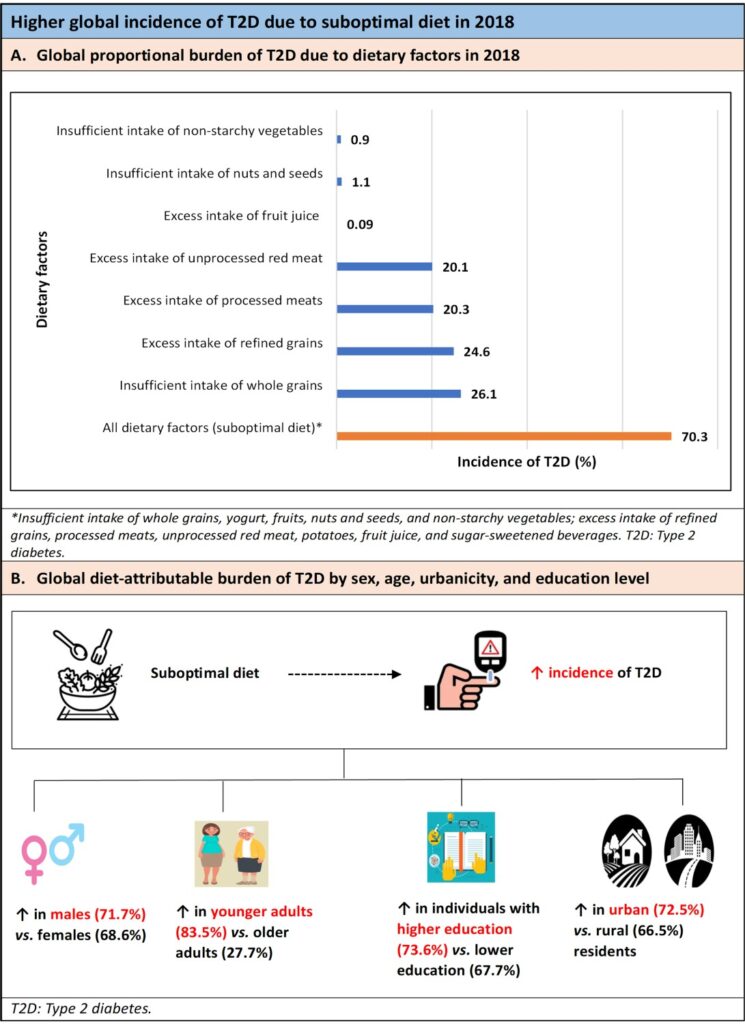
A study by Hearn MO et al., recently published in the journal “Nature Medicine”, reported that in 2018, 7 in 10 (14.1 million) new cases of type 2 diabetes (T2D) globally were found to be associated with suboptimal consumption of 11 dietary factors (discussed in the next paragraph). Furthermore, India had 50% cases of T2D attributable to poor, suboptimal diet.
This observational study utilized a comparative risk assessment model for estimating the effect of 11 dietary factors (insufficient intake of whole grains, yogurt, fruit, nuts and seeds, and non-starchy vegetables; excess intake of refined grains, processed meats, unprocessed red meat, potatoes, fruit juice, and sugar-sweetened beverages) jointly as well as individually on the incidence of new T2D cases among adults globally across 184 countries in 1990 and 2018.The study outcome (incidence of new-onset T2D) was investigated globally, regionally, and nationally. It was also evaluated based on age, sex, education, and urbanicity. The study findings were reported as percentage of cases (proportional attributable burden) and cases per 1 million adults (attributable rate).
The risk assessment model calculated the percentage of T2D incidence associated with each dietary factor by comparing present distribution of consumption with optimal intake distribution. The trends between 1990 and 2018 were compared by calculating differences for population attributable fractions by subtracting 1990 value from corresponding 2018 value for each simulation. Proportional multiplication was used to estimate the T2D burden due to suboptimal diet, assuming that half the benefit of whole-grain intake is mediated by replacement of refined rice and wheat intake. The results are summarized below:
- Globally, new cases of T2D due to suboptimal intake of 11 dietary factors were reported to be 70.3% or 14.1 million in 2018.
- The estimated global T2D burden was greatly contributed by excess intake of 6 harmful dietary factors (61%; refined rice and wheat, processed meats, unprocessed red meat, sugar-sweetened beverages, potatoes, and fruit juice) vs. insufficient intake of 5 protective dietary factors (39%; whole grains, yogurt, fruits, non-starchy vegetables, nuts, and seeds).
- The highest estimated burden of T2D incidence in 2018 was due to insufficient whole grains (26.1%), excess refined rice and wheat (24.6%), excess processed meats (20.3%), and excess unprocessed red meats (20.1%) among the individual dietary factors (Graphic A).
- The proportional burdens of T2D across regions due to suboptimal diet were highest in Central and eastern Europe and central Asia (85.6%) as well as Latin America and the Caribbean (82%), while they were lowest in South Asia (55.4%) and sub-Saharan Africa (68.1%). Moreover, India had 50.2% proportional burden of T2D due to suboptimal diet.
- The burden of T2D due to suboptimal diet was proportionally greater in younger adults (20–25 years) vs. older adults (≥95 years) and generally greater in men vs. women, urban vs. rural residents, and individuals with higher education vs. lower education, except in high-income countries as well as central and eastern Europe and central Asia, where the burden was larger in rural residents and lower educated individuals (Graphic B).
- The global incidence of T2D due to suboptimal diet increased in 2018 to 8.6 million more cases per year compared with 1990, with variation in these trends by world region and dietary factor.

Clinical implications
- The findings of this study provide information on dietary priorities as well as clinical and public health planning for improving the dietary quality and reducing T2D globally.
- The study highlighted that poor carbohydrate quality (excess refined rice and wheat and insufficient whole grains) is a leading driver of T2D due to suboptimal diet globally, emphasizing urgent attention to the quality of carbohydrates in daily diet.
- This study extended the database of prior global/national analyses of diet-related cardiometabolic disease with updated dietary and T2D data. It investigated the impact of refined grains, potatoes, non-starchy vegetables, and fruit juice on the global diabetes burden, which was not analyzed previously.
(Source: O’Hearn M, Lara-Castor L, Cudhea F, Miller V, Reedy J, Shi P, Zhang J, Wong JB, Economos CD, Micha R, Mozaffarian D; Global Dietary Database. Incident type 2 diabetes attributable to suboptimal diet in 184 countries. Nat Med. 2023;29(4):982-95.)
